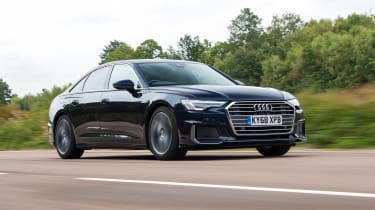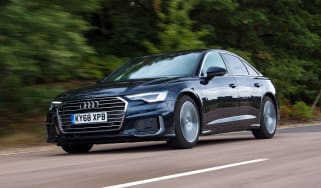Audi A6 review - MPG, running costs & CO2
"The Audi A6 promises running costs that are competitive with executive rivals, but there’s no EV"
Running costs are a big consideration in the executive class, and the latest A6 does much to appeal to private and business drivers alike, particularly since the plug-in hybrid finally arrived in late 2020. One virtue that's bound to appeal to both types of buyer is that demand for the A6 is usually high, particularly for the smaller, more economical models in the range. The 2.0-litre engines account for the lion's share of A6 sales and usually have the strongest residual values.
Audi A6 MPG & CO2
Fuel economy and emissions figures for the entry-level 2.0-litre '40 TDI' diesel engine are up to 50.4mpg, with a 147-151g/km CO2 emissions figure. This places it in a fairly high BiK band, but still in a lower company-car tax band than the petrols. Diesel has been the popular choice in this sector for years, but it’s no longer the best option for tax-conscious business users. For truly low running costs, you’ll need to look at one of the plug-in hybrids (PHEVs); there’s no pure-electric Audi A6 e-tron.
When it was available, the 3.0-litre V6 50 TDI engine returned in the region of 40mpg with CO2 emissions of around 180g/km. The 3.0-litre 55 TFSI petrol, meanwhile, is claimed to return up to 34.9mpg depending on trim and wheels, and emits from 185g/km of CO2. It clearly wasn’t a popular choice - it’s too costly for business users and overkill for most private buyers - so Audi withdrew it from sale.
More reviews
As mentioned, if you want an A6 capable of truly game-changing fuel economy, then look to one of the PHEVs. It’s not easy to predict exactly how much you’ll spend on fuel, as it all depends on how often you plug the car in. Audi claims up to 235mpg in official tests, though charging every night could see you beating that in everyday driving. If you never plug in, expect economy worse than 30mpg. Regardless, ultra-low company-car tax costs mean the 50 TFSI e models are excellent for business users.
Insurance
The Association of British Insurers, the body which assesses the risk of every new car on the market, has put the entry-level petrol A6 in group 35 out of 50. The now discontinued 3.0-litre 50 TDI will sit in group 42, while the quick 55 TFSI Vorsprung (also now off sale) is three groups higher.
Servicing
Servicing is made up of minor or major visits, either once yearly or on the basis of oil-quality sensors built into the engine – you can choose which method to follow when you buy your car.
Annual servicing is recommended for cars that cover fewer than 10,000 miles a year, or make frequent short journeys. If you spend much of your driving time on motorways and cover a higher annual mileage, two-year servicing will suit you. Audi also provides fixed-price service packages and will be able to discuss your requirements in person.
Warranty
Audi's standard UK warranty is a bit mean compared to those of BMW and Mercedes. You get three years/60,000 miles of cover, which pales against the unlimited-mileage warranties of rivals. Still, unless you consistently do more than 20k miles per year over the first three years, this won’t be too much cause for concern.
And besides, you can extend it at extra cost to five years/75,000 miles or five years/90,000 miles. Even these warranties fail to impress, though, when you consider Kia offers a seven-year/100,000-mile warranty as standard on all its cars.
Which Is Best?
Cheapest
- Name2.0 TFSI 204 Sport 4dr S Tronic
- Gearbox typeSemi-auto
- RRP£50,480
Most Economical
- Name2.0 e-Hybrid Quattro 299 Sport 4dr S Tronic
- Gearbox typeSemi-auto
- RRP£61,440
Fastest
- Name2.0 e-Hybrid Quattro 299 Sport 4dr S Tronic
- Gearbox typeSemi-auto
- RRP£61,440











